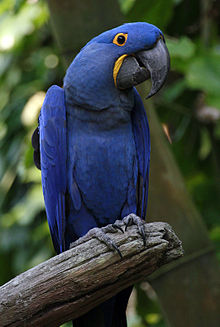Biodiversity & Environment
Smuggling of Exotic Macaws
- 23 Jun 2020
- 5 min read
Why in News
Recently, the Directorate of Revenue Intelligence (DRI) has busted a wildlife syndicate (smuggling group) which was involved in smuggling of exotic macaws from Bangladesh.
- The joint operation was carried out in coordination with the Wildlife Crime Control Bureau (WCCB) and the Customs Department at the Kolkata airport.
Key Points
- The Joint Operation:
- The cargo containing 22 exotic birds which had been smuggled in through the Bongaon area of Indo-Bangla border, were seized at Kolkata airport.
- The birds were identified as hyacinth macaw, pesquet’s parrot, severe macaw and hahn’s macaw.
- The seized macaws are protected under the Convention on International Trade in Endangered Species of Wild Fauna and Flora (CITES), with hyacinth macaw being accorded the highest protection.
- Provisions Related to Illegal Wildlife Trade:
- Illegally imported birds are confiscated under Section 111 of the Customs Act, 1962 which is read with the CITES provisions and the Foreign Trade Policy ( Import-Export Policy) of India.
- Also, Sections 48 and 49 of the Wildlife Protection Act prohibit trade or commerce in wild animals, animal articles or trophies.
- Concerns:
- The possibility of spread of zoonotic diseases on account of smuggling in such exotic species is increasingly becoming a global concern against the backdrop of Covid-19.
- Illegal wildlife trade was ranked the fourth largest transnational organised crime globally, after the smuggling of narcotics, counterfeit goods and human trafficking.
- West Bengal and northeast India are vulnerable to cross-border wildlife smuggling because of their proximity to the Bangladesh and Myanmar borders, and to Thailand.
- Over the recent years, the DRI has seized a range of endangered species, including black-and-white ruffed lemur, hoolock gibbons, palm civets and Indian star tortoise etc.
- Another major concern has been the smuggling of elephant tusks and ivory products.
- Many international organisations involved in wildlife crime use the Indo-Bangladesh Border for various other illegal activities, such as smuggling of drugs, commercial goods, and even gun-running, apart from illegal movement of foreign currency.
- Scientific Name: Anodorhynchus hyacinthinus,
- It is a parrot native to central and eastern South America.
- With a length of about one meter it is longer than any other species of parrot.
- It is the largest macaw and the largest flying parrot species.
- Threat: Habitat loss and the trapping of wild birds for the pet trade have taken a heavy toll on their population in the wild.
- Protection Status:
- International Union for Conservation of Nature's Red List: Vulnerable
- Convention on International Trade in Endangered Species of Wild Fauna and Flora (CITES): Appendix I
Wildlife Crime Control Bureau
- It is a statutory multi-disciplinary body, established by the Government of India under the Ministry of Environment, Forests and Climate Change, to combat organized wildlife crime in the country.
- The Bureau has its headquarters in New Delhi.
Directorate of Revenue Intelligence
- It is India's chief anti-smuggling intelligence, investigations and operations agency.
- It works under the Central Board of Indirect Taxes and Customs (CBIC), Ministry of Finance.
- It is headed by a Director General of the rank of Special Secretary to the Government of India.
- DRI works to secure India's national and economic security by preventing the outright smuggling of firearms, gold, narcotics, fake Indian Currency notes, antiques, wildlife and environmental products.
- Moreover, it also works to prevent the proliferation of black money, commercial frauds and trade based money laundering.
- Headquarters: New Delhi





